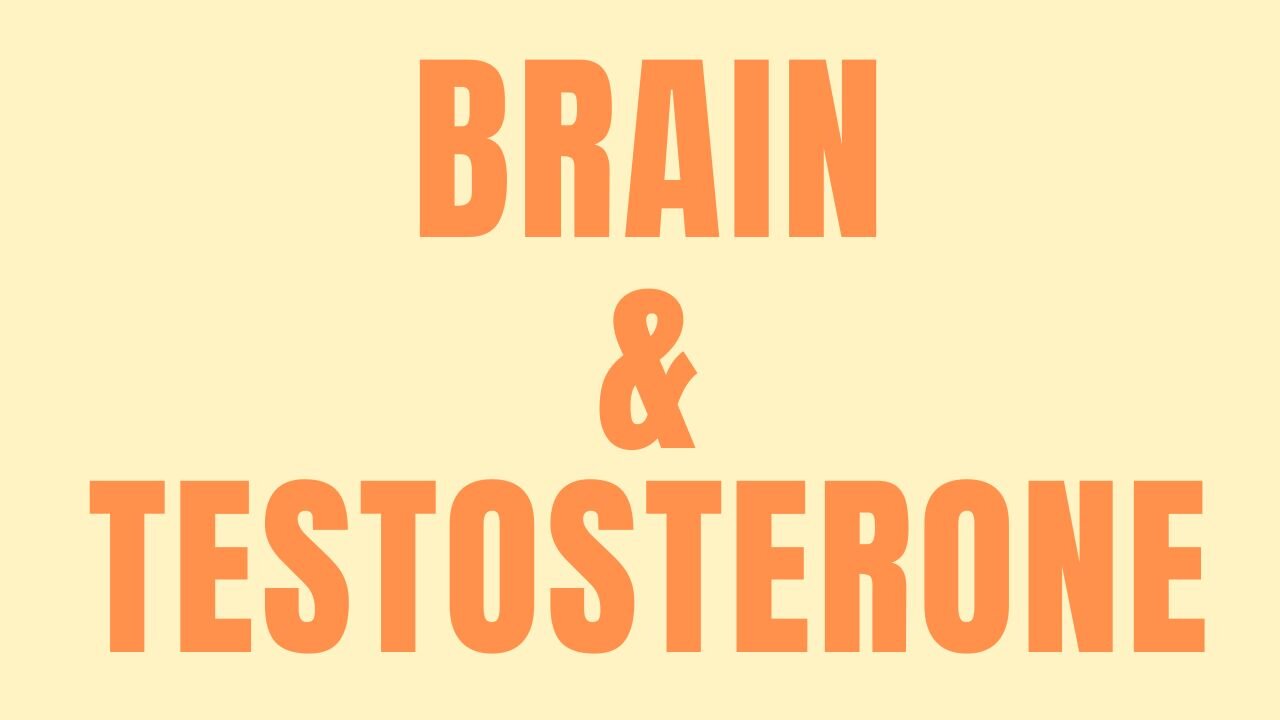Premium Only Content

The Impact of Testosterone on Brain Health: Unveiling the Cognitive Benefits Raindrops1 com
The Impact of Testosterone on Brain Health: Unveiling the Cognitive Benefits
Introduction:
In the realm of neuroscience, the influence of hormones on brain function has garnered increasing attention. Among these hormones, testosterone—a predominantly male hormone, though present in both genders—has emerged as a subject of profound interest. Beyond its well-known roles in muscle growth, libido, and overall vitality, recent research has shed light on its impact on brain health and cognitive function. Understanding the intricate relationship between testosterone and the brain could potentially pave the way for novel therapeutic interventions and lifestyle approaches to bolster cognitive well-being.
The Brain-Testosterone Connection:
Testosterone, primarily produced in the testes in males and in smaller quantities in the ovaries and adrenal glands in females, is a steroid hormone with multifaceted effects throughout the body. Within the brain, testosterone exerts its influence through various mechanisms. It interacts with androgen receptors present in neural tissue, modulates neurotransmitter systems, and influences the structure and function of brain regions involved in cognition and emotion.
Cognitive Benefits of Testosterone:
Research indicates that testosterone plays a pivotal role in several cognitive domains, including memory, attention, spatial abilities, and executive functions. Studies have shown that individuals with higher levels of testosterone tend to exhibit better performance in cognitive tasks, such as verbal fluency, spatial reasoning, and working memory. Moreover, testosterone has been linked to enhanced cognitive resilience, reducing the risk of cognitive decline and neurodegenerative conditions such as Alzheimer's disease.
Memory and Learning:
One of the most notable cognitive benefits associated with testosterone is its impact on memory and learning. Animal studies have demonstrated that testosterone administration can improve spatial memory and learning abilities. In humans, higher testosterone levels have been correlated with better performance on memory tasks, suggesting a potential role in memory consolidation and retrieval processes.
Attention and Focus:
Testosterone also appears to influence attentional processes and cognitive focus. Research suggests that individuals with higher testosterone levels exhibit greater attentional control and sustained focus, leading to improved performance in tasks requiring concentration and vigilance. This aspect of testosterone's effect on cognition may have implications for enhancing productivity and cognitive performance in various domains.
Mood Regulation:
Beyond cognitive function, testosterone plays a role in emotional regulation and mood stability. Low testosterone levels have been associated with symptoms of depression, anxiety, and irritability. Conversely, optimizing testosterone levels through hormone replacement therapy or lifestyle modifications may alleviate mood disturbances and promote emotional well-being, thereby indirectly supporting cognitive health.
Neuroprotective Effects:
Emerging evidence suggests that testosterone possesses neuroprotective properties, shielding the brain from age-related degeneration and pathological processes. Testosterone has been shown to promote neuronal survival, enhance synaptic plasticity, and mitigate neuroinflammation, all of which contribute to the preservation of cognitive function across the lifespan. These neuroprotective effects underscore the importance of maintaining optimal testosterone levels for long-term brain health.
Implications for Health and Aging:
The cognitive benefits of testosterone have significant implications for health and aging. As individuals age, testosterone levels naturally decline, potentially contributing to age-related cognitive decline and vulnerability to neurodegenerative diseases. Strategies aimed at preserving or augmenting testosterone levels through lifestyle modifications, dietary interventions, and hormone replacement therapy may offer a promising avenue for mitigating cognitive decline and promoting healthy aging.
Conclusion:
In conclusion, testosterone exerts a profound influence on brain health and cognitive function, encompassing memory, attention, mood regulation, and neuroprotection. Understanding the intricate interplay between testosterone and the brain opens new avenues for therapeutic interventions and lifestyle strategies aimed at optimizing cognitive well-being across the lifespan. By harnessing the cognitive benefits of testosterone, we may empower individuals to safeguard their brain health and preserve cognitive function as they age.
-
 1:00:32
1:00:32
Man in America
11 hours ago🔴 LIVE: Terror Attacks or False Flags? IT DOESN'T ADD UP!!!
59K20 -
 1:02:38
1:02:38
Donald Trump Jr.
13 hours agoNew Year’s Terror, Latest Breaking News with Sebastian Gorka | TRIGGERED Ep.204
194K399 -
 59:59
59:59
The StoneZONE with Roger Stone
8 hours agoAfter Years of Targeting Trump, FBI and DOJ are Unprepared to Stop Terror Attacks | The StoneZONE
60.7K19 -
 1:26:42
1:26:42
Leonardaisfunny
7 hours ago $4.26 earnedH-1b Visas: Infinity Indians
39.1K18 -
 1:08:33
1:08:33
Josh Pate's College Football Show
11 hours ago $2.57 earnedPlayoff Reaction Special: Ohio State Owns Oregon | Texas Survives | UGA vs Notre Dame Takeaways
36.5K6 -
 58:04
58:04
Kimberly Guilfoyle
11 hours agoFBI's Terror Response Failures, Live with Steve Friend & Kyle Seraphin | Ep. 185
110K45 -
 2:15:01
2:15:01
WeAreChange
12 hours agoMassive Developments In Vegas Investigation! UNREAL DETONATION, Shocking Details Emerge!
115K89 -
 54:02
54:02
LFA TV
18 hours ago2025 Is Off to a Violent Start | TRUMPET DAILY 1.2.25 7pm
50.3K9 -
 59:27
59:27
theDaily302
18 hours agoThe Daily 302- JJ Carrell
43.1K5 -
 2:57
2:57
EvenOut
2 days ago $1.90 earnedTHE TELEPORTING PORTA POTTY TWIN RPANK!
40.4K3